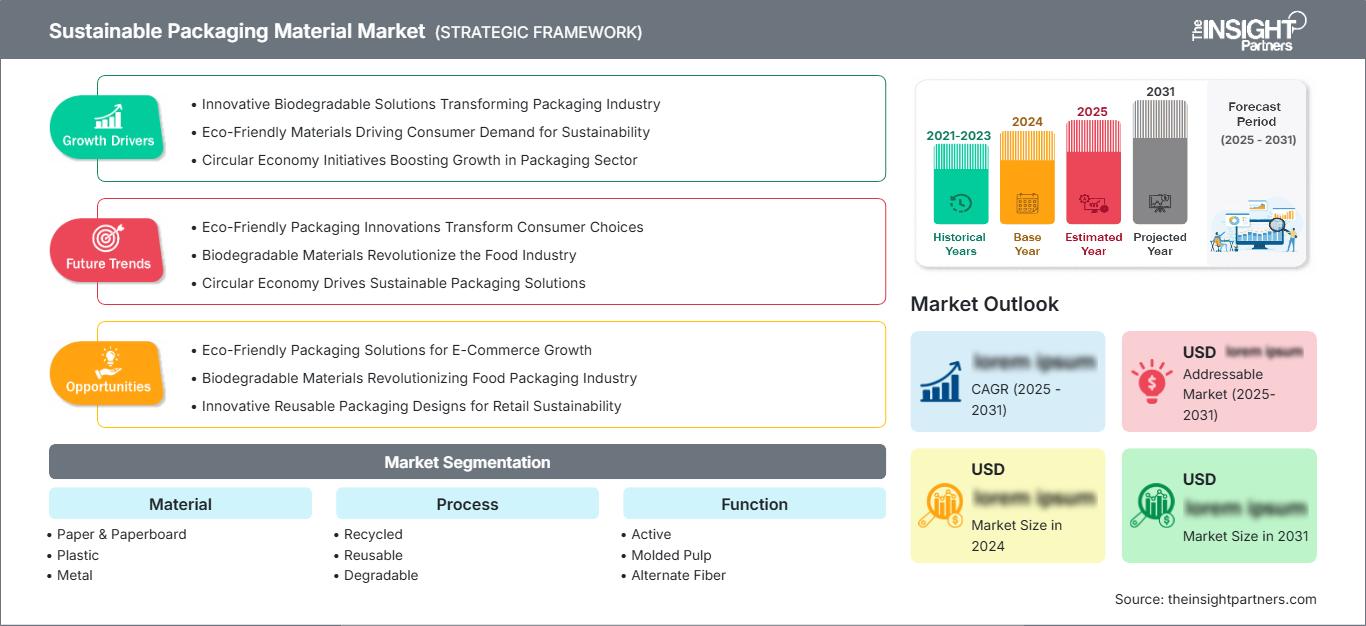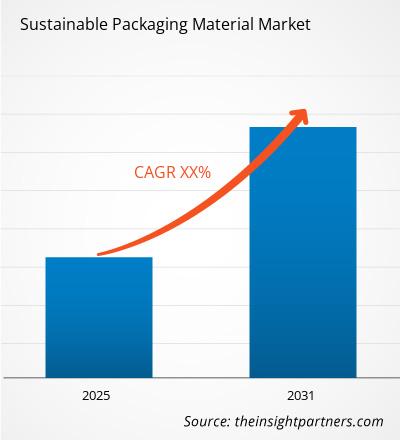Se prevé que el mercado de materiales de embalaje sostenibles registre una tasa de crecimiento anual compuesta (CAGR) del XX% entre 2025 y 2031, con un tamaño de mercado que se expandirá de XX millones de dólares estadounidenses en 2024 a XX millones de dólares estadounidenses en 2031.
El informe se clasifica por material (papel y cartón, plástico, metal y vidrio) y analiza el mercado según el proceso (reciclado, reutilizable y degradable). También examina el mercado por función (activo, pulpa moldeada y fibra alternativa) y aplicación industrial (alimentación y bebidas, farmacéutica). Se ofrece un desglose completo a nivel global, regional y nacional para cada uno de estos segmentos clave.
El informe incluye el tamaño del mercado y las previsiones para todos los segmentos, con valores expresados en USD. Asimismo, proporciona estadísticas clave sobre la situación actual del mercado de los principales actores, junto con información sobre las tendencias de mercado predominantes y las oportunidades emergentes.
Finalidad del informe
El informe «Mercado de materiales de embalaje sostenibles», elaborado por The Insight Partners, tiene como objetivo describir el panorama actual y el crecimiento futuro, los principales factores impulsores, los desafíos y las oportunidades. Esto proporcionará información valiosa a diversos actores del sector, tales como:
- Proveedores/fabricantes de tecnología: Para comprender la evolución de la dinámica del mercado y conocer las posibles oportunidades de crecimiento, lo que les permitirá tomar decisiones estratégicas informadas.
- Inversores: Realizar un análisis exhaustivo de las tendencias relativas a la tasa de crecimiento del mercado, las proyecciones financieras del mercado y las oportunidades que existen a lo largo de la cadena de valor.
- Organismos reguladores: Regular las políticas y controlar las actividades en el mercado con el objetivo de minimizar los abusos, preservar la confianza de los inversores y mantener la integridad y la estabilidad del mercado.
Segmentación del mercado de materiales de embalaje sostenibles
Material
- Papel y cartón
- Plástico
- Metal
- Vaso
Proceso
- Reciclado
- Reutilizable
- Degradable
Función
- Activo
- Pulpa moldeada
- Fibra alternativa
Solicitud
- Alimentos y bebidas
- Farmacéutico
Obtendrá personalización gratuita de cualquier informe, incluyendo partes de este informe, análisis a nivel de país y paquetes de datos de Excel. Además, podrá aprovechar excelentes ofertas y descuentos para empresas emergentes y universidades.
Mercado de materiales de embalaje sostenibles: Perspectivas estratégicas

-
Obtenga las principales tendencias clave del mercado que se describen en este informe.Esta muestra GRATUITA incluirá análisis de datos, que abarcarán desde tendencias de mercado hasta estimaciones y pronósticos.
Factores que impulsan el crecimiento del mercado de materiales de embalaje sostenibles
- Soluciones biodegradables innovadoras que transforman la industria del embalaje
- Los materiales ecológicos impulsan la demanda de sostenibilidad por parte de los consumidores.
- Las iniciativas de economía circular impulsan el crecimiento en el sector del embalaje.
Tendencias futuras del mercado de materiales de embalaje sostenibles
- Las innovaciones en envases ecológicos transforman las decisiones de los consumidores.
- Los materiales biodegradables revolucionan la industria alimentaria
- La economía circular impulsa soluciones de embalaje sostenibles
Oportunidades de mercado de materiales de embalaje sostenibles
- Soluciones de embalaje ecológicas para el crecimiento del comercio electrónico
- Materiales biodegradables que revolucionan la industria del envasado de alimentos
- Diseños innovadores de envases reutilizables para la sostenibilidad del comercio minorista
Perspectivas regionales del mercado de materiales de embalaje sostenibles
Los analistas de The Insight Partners han explicado en detalle las tendencias regionales y los factores que influyen en el mercado de materiales de embalaje sostenibles durante el período de previsión. Esta sección también analiza los segmentos y la geografía del mercado de materiales de embalaje sostenibles en Norteamérica, Europa, Asia Pacífico, Oriente Medio y África, y Sudamérica y Centroamérica.
Alcance del informe de mercado de materiales de embalaje sostenibles
| Atributo del informe | Detalles |
|---|---|
| Tamaño del mercado en 2024 | XX millones de dólares estadounidenses |
| Tamaño del mercado para 2031 | XX millones de dólares estadounidenses |
| Tasa de crecimiento anual compuesto global (2025 - 2031) | XX% |
| Datos históricos | 2021-2023 |
| período de previsión | 2025-2031 |
| Segmentos cubiertos |
Por material
|
| Regiones y países cubiertos |
América del norte
|
| Líderes del mercado y perfiles de empresas clave |
|
Densidad de los actores del mercado de materiales de embalaje sostenibles: comprensión de su impacto en la dinámica empresarial
El mercado de materiales de embalaje sostenibles está creciendo rápidamente, impulsado por la creciente demanda de los usuarios finales debido a factores como la evolución de las preferencias de los consumidores, los avances tecnológicos y una mayor conciencia de los beneficios del producto. A medida que aumenta la demanda, las empresas amplían su oferta, innovan para satisfacer las necesidades de los consumidores y aprovechan las nuevas tendencias, lo que impulsa aún más el crecimiento del mercado.

- Obtenga una visión general de los principales actores del mercado de materiales de embalaje sostenibles.
Puntos clave de venta
- Cobertura integral: El informe abarca de forma exhaustiva el análisis de productos, servicios, tipos y usuarios finales del mercado de materiales de embalaje sostenibles, proporcionando una visión holística.
- Análisis de expertos: El informe se elabora a partir del profundo conocimiento de expertos y analistas del sector.
- Información actualizada: El informe garantiza su relevancia para el negocio gracias a su cobertura de información reciente y tendencias de datos.
- Opciones de personalización: Este informe se puede personalizar para satisfacer las necesidades específicas del cliente y adaptarse adecuadamente a las estrategias comerciales.
Por lo tanto, el informe de investigación sobre el mercado de materiales de embalaje sostenibles puede ayudar a impulsar la comprensión del panorama del sector y sus perspectivas de crecimiento. Si bien existen algunas preocupaciones válidas, los beneficios generales de este informe tienden a superar las desventajas.
- Análisis histórico (2 años), año base, pronóstico (7 años) con CAGR
- Análisis PEST y FODA
- Tamaño del mercado, valor/volumen: global, regional y nacional
- Industria y panorama competitivo
- Conjunto de datos de Excel
Informes recientes
Testimonios
Razón para comprar
- Toma de decisiones informada
- Comprensión de la dinámica del mercado
- Análisis competitivo
- Información sobre clientes
- Pronósticos del mercado
- Mitigación de riesgos
- Planificación estratégica
- Justificación de la inversión
- Identificación de mercados emergentes
- Mejora de las estrategias de marketing
- Impulso de la eficiencia operativa
- Alineación con las tendencias regulatorias






















 Obtenga una muestra gratuita para - Mercado de materiales de embalaje sostenibles
Obtenga una muestra gratuita para - Mercado de materiales de embalaje sostenibles